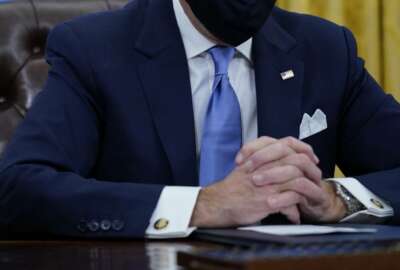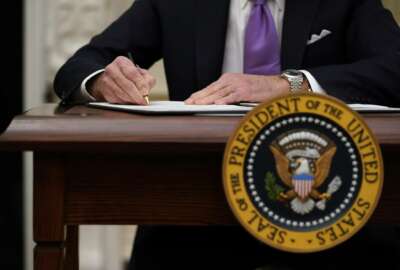
Some agencies moving faster than others to roll back Trump workforce orders
The National Treasury Employees Union said agencies are responding to the Biden's administration's call to restore labor relations in a variety of ways. Some...
Federal employees unions noticed early on in the lifecycle of former President Donald Trump’s workforce executive orders that some agencies raced to enforce them, while others seemed to drag their feet.
But much like they were implemented, the National Treasury Employees Union said agencies are so far taking a variety of paths to repeal the Trump administration’s workforce policies and restore labor relations. Some are moving with greater speed than others.
President Joe Biden signed an executive order on his third day in office that rescinded the three May 2018 executive orders from his predecessor.
The Office of Personnel Management issued new guidance to agencies less than two weeks ago, detailing the steps they should take to immediately repeal the Trump orders and reengage with federal employee unions.
Agencies so far have viewed that guidance in a variety of ways. Some, like the Department of Health and Human Services, are still waiting for the Senate to confirm a permanent secretary to lead the agency. The Senate is supposed to confirm Xavier Becerra, the Biden’ administration’s nominee to lead HHS, in the coming days.
NTEU National President Tony Reardon said that shouldn’t deter agencies from implementing an executive order and OPM guidance.
Reardon said he wrote twice to acting HHS Secretary Norris Cochran after Biden signed his Jan. 22 executive order.
“I’ve heard nothing from HHS leadership. I find that staggering,” Reardon told reporters Tuesday. The union hosted its annual legislative conference virtually with about 300 of its members.
HHS implemented key provisions of the Trump executive orders through a contract several years ago, which the Federal Service Impasses Panel imposed on the union.
An arbitrator last year said HHS had improperly imposed the panel’s decision on NTEU. It ordered both parties to return to the bargaining table, and NTEU is hopeful new leadership will engage with the union to develop a new contract.
So far, it hasn’t happened, Reardon said.
“HHS has been intransigent,” he said. “They really haven’t indicated … that they’re acting in any way that would suggest that they’re ready to start doing the right thing and ready to go to the bargaining table, do away with all of the May 2018 executive orders and sit down and bargain in good faith.”
HHS didn’t immediately return a request for comment on Tuesday about its plans for Biden’s executive order.
The response has been different at agencies.
The U.S. Patent and Trademark Office, for example, is restoring official time with the union.
“We recently have settled all of our outstanding issues related to those executive orders,” said Jay Besch, president of the NTEU chapter representing trademark examining attorneys and trademark trial and appeal board interlocutory attorneys at PTO. “PTO is rescinding the arbitrary caps on our official time that limited my ability and our representatives’ ability to represent our employees. We are fully returning to the contract in place prior to the executive orders.”
At the Energy Department, where negotiations are ongoing, NTEU has noticed a shift in tone.
“The agency is striking its earlier proposals that fell in line with the [May] 2018 executive orders as we move through bargaining,” Reardon said. “We’ve made progress, but there are still open articles at Energy that we have yet to bargain.”
NTEU will also return to the bargaining table with the Environmental Protection Agency at the end of the month, Reardon said.
“We’ve asked the agency to take the steps necessary and implement President Biden’s executive order and revise their proposals, and EPA has indicated that it’s reviewing our request,” he said. “I’m hopeful that we’re going to see a marked change in agency proposals.”
Reardon acknowledged returning to the status quo before Trump’s workforce executive orders will take time, a process that’s made more complicated as agencies staff up with new political appointees.
“We have to recognize on some level that we have a new administration. Consequently you have new leadership in the agency, and it does take a little bit of time,” he said. “I do not assign in every situation some ill intent. It takes a little bit of time for them to get their feet on the ground.”
An agency’s culture and its history with federal employee unions may play a role as well, Reardon said. Some agencies are larger and more complex than others.
The previous administration’s 2018 executive orders had little to no impact on NTEU’s largest bargaining unit, where an agreement has been in place between the IRS and the union for much of the last four years, Reardon said.
NTEU began bargaining negotiations on a new contract with the IRS last week, Reardon said.
Union looking for more assurances on vaccines for federal employees
A year into the pandemic, NTEU said it remains concerned about the safety protocols at the agencies where it has members. Securing vaccines for federal employees, especially those whose jobs aren’t eligible for telework, is a top priority.
Few federal agencies are receiving their own allocation of COVID-19 vaccines from HHS. The Department of Homeland Security has an agreement with the Department of Veterans Affairs, which is vaccinating frontline DHS law enforcement officers at Customs and Border Protection and other subcomponents.
The vaccination process has been slow, said Rob Holland, president of the NTEU chapter representing CBP officers in Detroit. He said he received a vaccine through his state, not CBP.
“We think DHS could have done more. As soon as the vaccines were available, they could have secured a supply of the shots for us,” Holland said.
Supply limitations are a challenge at the Treasury Department and the IRS as well, Reardon said. He’s spoken with Treasury Secretary Janet Yellen, who told NTEU the department had identified the employees it would like to vaccinate, if it had the supplies.
IRS employees are sending out a third round of stimulus checks to the public, along with new tax credits to families with children, during the middle of filing season.
“There remains a great deal of concern on the part of employees who have been called back to work that they will remain safe,” Reardon said. “If you’re going to require employees to come into the workplace, especially given now that we have a vaccine, the federal government should have done the work necessary early on to get these folks vaccinated.”
Copyright © 2025 Federal News Network. All rights reserved. This website is not intended for users located within the European Economic Area.
Nicole Ogrysko is a reporter for Federal News Network focusing on the federal workforce and federal pay and benefits.
Follow @nogryskoWFED






